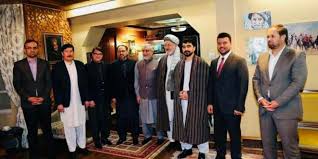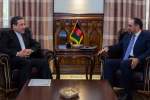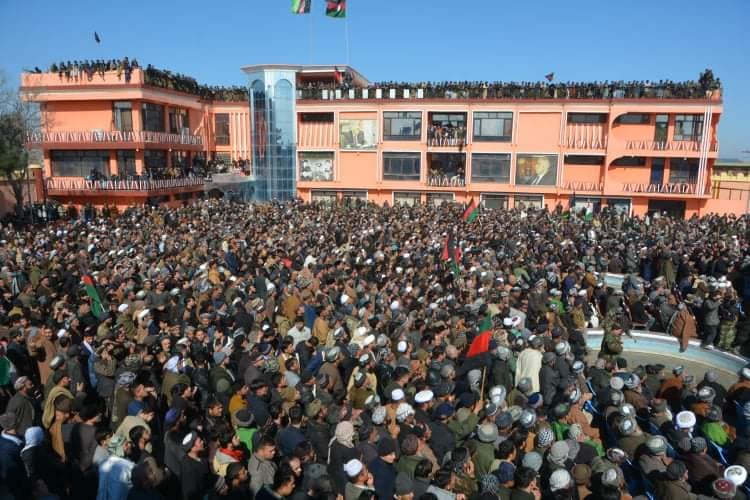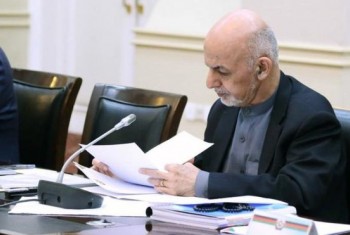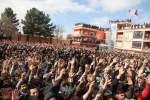Several prominent political figures endorsed a ‘parallel government’ concept in case the election results are not announced transparent.
Publish dateTuesday 18 February 2020 - 00:15
Story Code : 203718
General Abdul Rashid Dostum, the First Vice President and a key political figure for the northern Afghan provinces warned of announcing a ‘parallel government’ led by Abdullah Abdullah if the election results are not clean and fraudless.
Abdul Rashid Dostum was speaking in Zahiruddin Babur’s memorial ceremony in Sheberghan of Jawzjan province last week, where he said fraudulent election results will not be accepted.
“If there is fraud and your votes are ignored and not counted, I will not accept the election results even if sword and knife are around my neck,” said General Dostum addressing the people present at the memorial event.
Soon after the statements made by a high ranking government official and a prominent political figure went viral in the media and several other politicians endorsed General Dostum’s declarations.
Ahmad Zia Massoud, brother of Ahmad Shah Massoud, the National Hero who assassinated by the Al-Qaeda terrorists back in 2001, announced his endorsements from the statements made by General Dostum in reference to a ‘parallel government’ concept if the electoral commissions cannot separate the fake votes from the real votes.
Islamic Jamiat Party of Afghanistan led by Salahuddin Rabbani, National Unity Party of Afghanistan led by Sayed Mansoor Naderi and the Islamic Solidarity Party of Afghanistan led by Haji Mohammad Mohaqeq published press releases in support to General Abdul Rashid Dostum’s assertions on the establishment of a ‘parallel government’.
This comes as the final results for the Afghan presidential election held on September 28, 2019 hast come out yet.
The preliminary election results announced by the IEC on the 22nd December 2019 sparked mix reactions among the public members and Afghan elites as the election commission did not provide clear answers on the 300,000 controversial votes, Abdullah’s electoral team claimed these votes were fraudulent.
The Independent Election Complaints Commission (IECC) was also not able to decide about the 300,000 controversial votes. A special committee has been called to assess the votes that are under dispute.
According to a report by Salam Watandar, there are serious issues and disagreements between the IEC and IECC. A member of the IECC has accused Habib Al Rahman Nang, the head of the secretariat at IEC, for distortion of their decisions.
Mawlawi Din Mohammad Azimi, a member of the IECC claimed that Habib Al Rahman Nang has distorted one of their decision about assessing the ballot papers in certain election sites.
According to Azimi, the IECC declared to assess the ballot papers based on the verification of the QR codes, but Habib Al Rahman Nang at IEC has changed and falsified the decision text to ‘assessing the ballot papers based on the presence of QR codes on the ballot papers’.
The IEC has not yet officially commented in reference to the recent claims by the IECC.
Abdul Rashid Dostum was speaking in Zahiruddin Babur’s memorial ceremony in Sheberghan of Jawzjan province last week, where he said fraudulent election results will not be accepted.
“If there is fraud and your votes are ignored and not counted, I will not accept the election results even if sword and knife are around my neck,” said General Dostum addressing the people present at the memorial event.
Soon after the statements made by a high ranking government official and a prominent political figure went viral in the media and several other politicians endorsed General Dostum’s declarations.
Ahmad Zia Massoud, brother of Ahmad Shah Massoud, the National Hero who assassinated by the Al-Qaeda terrorists back in 2001, announced his endorsements from the statements made by General Dostum in reference to a ‘parallel government’ concept if the electoral commissions cannot separate the fake votes from the real votes.
Islamic Jamiat Party of Afghanistan led by Salahuddin Rabbani, National Unity Party of Afghanistan led by Sayed Mansoor Naderi and the Islamic Solidarity Party of Afghanistan led by Haji Mohammad Mohaqeq published press releases in support to General Abdul Rashid Dostum’s assertions on the establishment of a ‘parallel government’.
This comes as the final results for the Afghan presidential election held on September 28, 2019 hast come out yet.
The preliminary election results announced by the IEC on the 22nd December 2019 sparked mix reactions among the public members and Afghan elites as the election commission did not provide clear answers on the 300,000 controversial votes, Abdullah’s electoral team claimed these votes were fraudulent.
The Independent Election Complaints Commission (IECC) was also not able to decide about the 300,000 controversial votes. A special committee has been called to assess the votes that are under dispute.
According to a report by Salam Watandar, there are serious issues and disagreements between the IEC and IECC. A member of the IECC has accused Habib Al Rahman Nang, the head of the secretariat at IEC, for distortion of their decisions.
Mawlawi Din Mohammad Azimi, a member of the IECC claimed that Habib Al Rahman Nang has distorted one of their decision about assessing the ballot papers in certain election sites.
According to Azimi, the IECC declared to assess the ballot papers based on the verification of the QR codes, but Habib Al Rahman Nang at IEC has changed and falsified the decision text to ‘assessing the ballot papers based on the presence of QR codes on the ballot papers’.
The IEC has not yet officially commented in reference to the recent claims by the IECC.
avapress.net/vdca6enua49nw01.tgk4.html
Tags
Top hits
